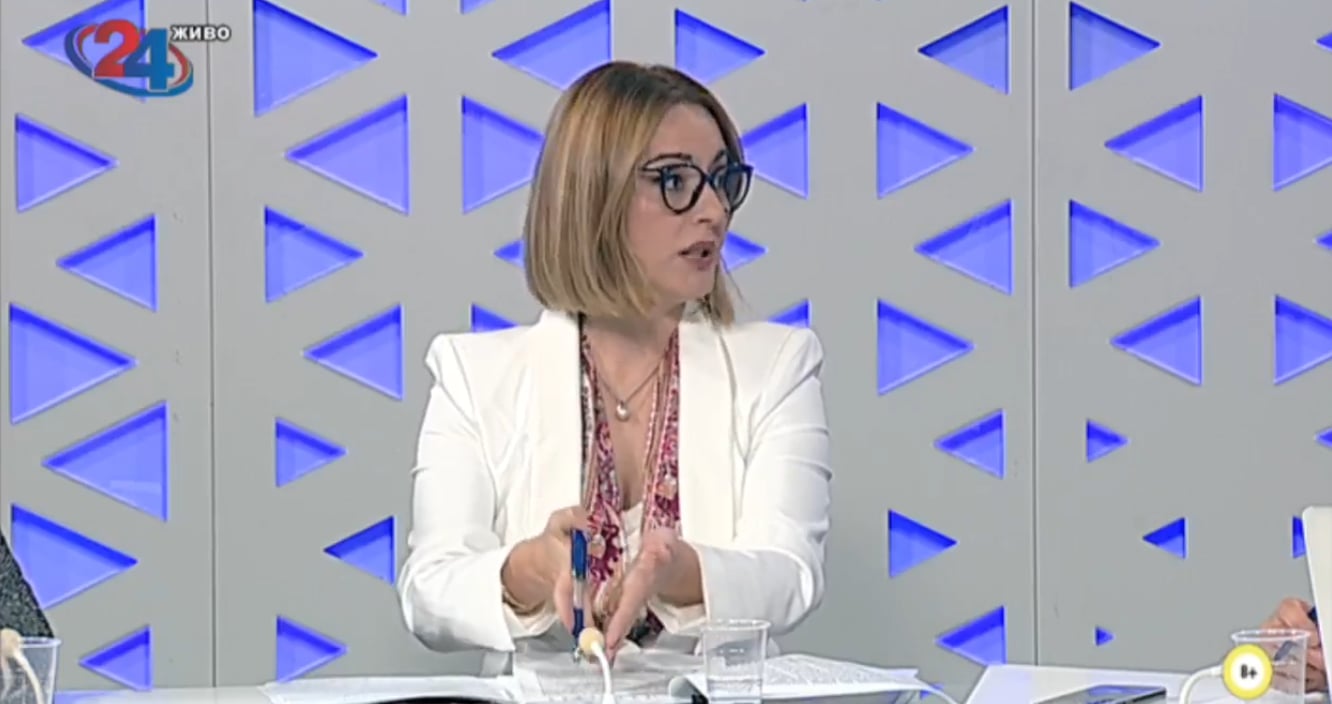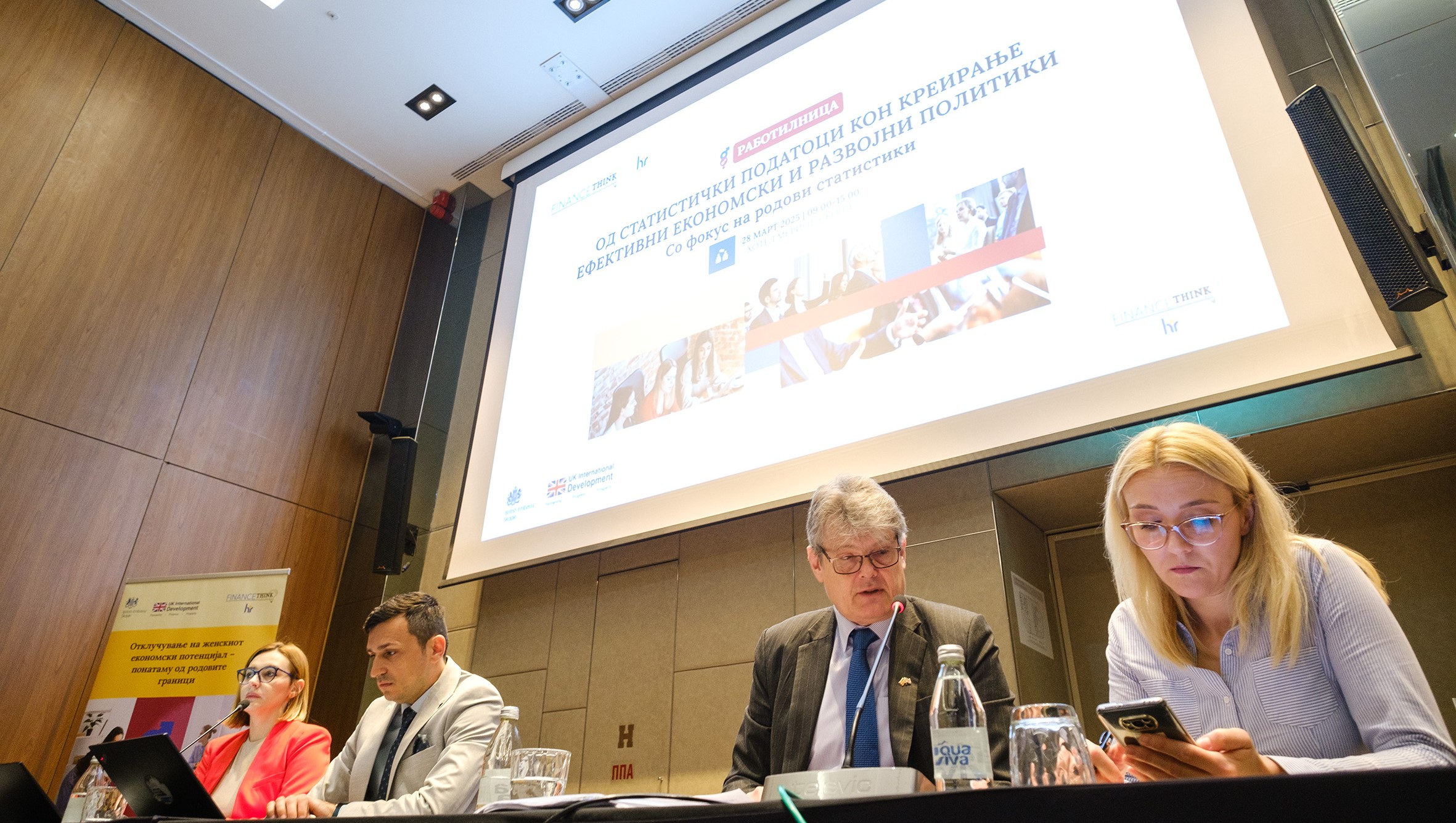In „Otvoreno“ on TV 24, Blagica Petreski speaks on current economic topics
The Ambassador of Kazakhstan visits Finance Think
The Economic Forum on Working Women’s Productivity Successfully Concluded!
On current economic topics, Blagica Petreski speaks for Sitel in “Topic of the day”
The full video on the link.
FT Opinion 63 on the possible effects of the introduction of tariffs by the US on North Macedonia
Workshop – From Statistical Data to Effective Policies
📊 From Statistical Data to Effective Policies!
Today, we held the workshop “From Statistical Data to Creating Effective Economic and Development Policies”, with a focus on gender statistics, in collaboration with the State Statistical Office (MakStat / MakStat). 👥
🔍 Together with representatives from all relevant institutions, we explored:
✔️ The available data from the State Statistical Office
✔️ Their utilization in research analyses and Finance Think’s models
✔️ The possibilities for integrating findings into policymaking
🎯 Our goal: To ensure that data serve as the foundation for evidence-based policymaking – for more inclusive and equitable development!
Supported by British Embassy Skopje
A special thanks to the Ministry of Finance, Ministry of Labor and Social Policy, Ministry of Education and Science, Ministry of Health, Employment Agency of North Macedonia, Ministry of Energy, Mining, and Mineral Resources, UNICEF MK, and UN Women Skopje for their participation.
#EvidenceBasedPolicies #GenderStatistics #EconomicDevelopment #FinanceThink #MakStat
📸 More photos: https://www.flickr.com/…/fosim/albums/72177720324734083/
Finance Think and University of Dubrovnik’s CREDO Sign Memorandum of Understanding
Skopje/Dubrovnik – Finance Think – Economic Research & Policy Institute, Skopje, and the University of Dubrovnik’s Center for Research of Digital Transformation (CREDO) have signed a Memorandum of Understanding (MoU) to foster collaboration in research, capacity building, and academic exchange.
The MoU, signed on March 18, 2025, by Dr. Blagica Petreski, CEO and Chief Economist of Finance Think, and Prof. Dr. Nebojša Stojčić, Founder of CREDO and Rector of the University of Dubrovnik, establishes a framework for joint initiatives in economics, public policy, and digital transformation.
As two leading institutions recognized for their excellence in economic research and digital transformation, this partnership brings together Finance Think’s expertise in data-driven policy analysis and evidence-based economic solutions with CREDO’s cutting-edge research in digital transformation, business innovation, and economic competitiveness.
Under this agreement, both institutions will join forces in several key areas to advance research and knowledge exchange. A strong emphasis will be placed on joint research projects, where Finance Think and CREDO will collaborate on high-impact studies in economics, public policy, and digital transformation. Recognizing the importance of capacity building, they will design and deliver specialized training programs, workshops, and seminars aimed at equipping researchers, students, and professionals with cutting-edge skills and insights. In addition, the partnership will enhance international collaboration through Erasmus+ and other EU-funded initiatives, facilitating staff exchanges, joint project applications, and coordinated implementation efforts. The two institutions will also prioritize knowledge sharing, ensuring the open exchange of research findings, data, and academic resources to drive innovation and strengthen their respective fields. Finance Think and CREDO will work closely on academic and policy engagement, co-organizing conferences, producing joint publications, and contributing to evidence-based policymaking.
“As a leading research institute dedicated to shaping economic policies through rigorous analysis, Finance Think is excited to collaborate with CREDO. Together, we will advance research and capacity-building efforts that contribute to economic resilience, digital innovation, and sustainable development in the region,” said Dr. Blagica Petreski, CEO of Finance Think.
Echoing this sentiment, Prof. Dr. Nebojša Stojčić, Rector of the University of Dubrovnik, stated, “This partnership marks an important step in enhancing regional cooperation in economic and digital transformation research. Both Finance Think and CREDO have built strong reputations for excellence, and by combining our expertise, we aim to drive meaningful policy impact and support academic development in our respective fields.”
The MoU is effective immediately and will remain in force for three years, with the possibility of renewal. Both institutions are committed to leveraging their strengths to foster innovation, research excellence, and cross-border academic cooperation.
Our newest #book on Amazon!
Debate with the business sector on productivity, with focus on women
📢 In today’s discussion with the business sector, we talked about:
📈 Business sector practices for productivity and labor force activation, with a special focus on women.
⚙️ The needs and necessary regulatory and policy changes to boost productivity and fully utilize the economic potential of women. 🚀
🎯 We validated the designed recommendations from our research.
The discussion was organized in collaboration with the British Business Association in North Macedonia and supported by the British Embassy Skopje.
Stay tuned!










